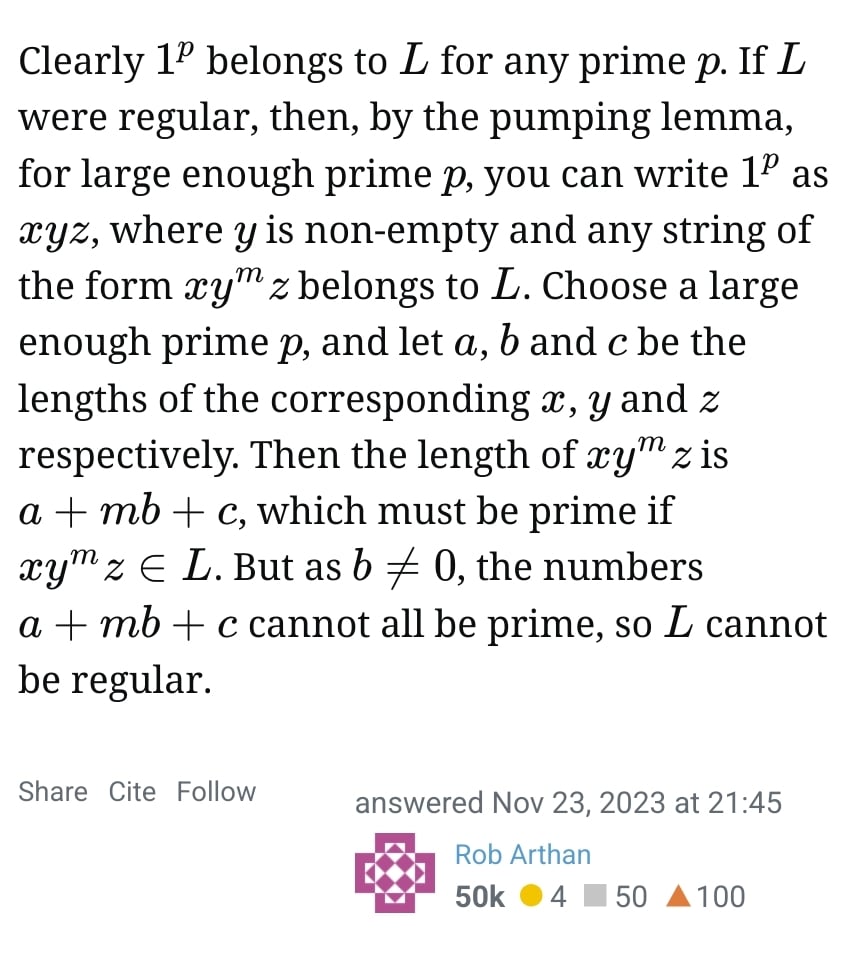^.?$|^(..+?)\1+$
<answer>
Matches strings of any character repeated a non-prime number of times
So, here’s my attempt
The first portion (
^.?$) matches all lines of 0 or 1 characters.The second portion (
^(..+?)\1+$) is more complicated:(..+?)is a capture group that matches the first character in any line, followed by a smallest possible non-zero number of characters such that (2) still matches (note that the minimum length of this match is 2)\1+matches as many as possible (and more than 0) repeats of the (1) group
I think what this does is match any line consisting of a single character with the length
- divisible by some number (due to the more than 0 condition in (2), so that there have to be repeats in the string), that’s not
1(due to the note in (1), so that the repeating portion has to be at least 2 characters long), or- the length itself (due to the more than 0 condition in the (2), so that there is at least one repetition)
Therefore, combined with the first portion, it matches all lines of the same character whose lengths are composite (non-prime) numbers? (it will also match any line of length 1, and all lines consisting of the same string repeated more than one time)
So this is a definite example of “regex” that’s not regular, then. I really don’t think there’s any finite state machine that can track every possible number of string repeats separately.
You got downvoted here but you’re absolutely right. It’s easy to prove that the set of strings with prime length is not a regular language using the pumping lemma for regular languages. And in typical StackExchange fashion, someone’s already done it.
Here’s their proof.
Claim 1: The language consisting of the character
1repeated a prime number of times is not regular.
A further argument to justify your claim—
Claim 2: If the language described in Claim 1 is not regular, then the language consisting of the character
1repeated a composite number of times is not regular.Proof: Suppose the language described in Claim 2 is regular if the language described in Claim 1 is not. Then there must exist a finite-state automaton A that recognises it. If we create a new finite-state automaton B which (1) checks whether the string has length 1 and rejects it, and (2) then passes the string to automaton A and rejects when automaton A accepts and accepts when automaton A rejects, then we can see that automaton B accepts the set of all strings of non-composite length that are not of length 1, i.e. the set of all strings of prime length. But since the language consisting of all strings of prime length is non-regular, there cannot exist such an automaton. Therefore, the assumption that the language described in Claim 2 being regular is false.
By now, I have just one, so thanks for the assist. There’s always that one (sometimes puzzling) downvote on anything factual.
The pumping lemma, for anyone unfamiliar. It’s a consequence of the fact an FSM is finite, so you can construct a repeatable y just by exhausting the FSM’s ability to “remember” how much it’s seen.
You can have states point to each other in a loop, no?
If the set of all strings of composite length is a regular language, you can use that to prove the set of all strings of prime length are also a regular language.
But it’s also easy to prove that the set of language of strings of prime length is not regular, and thus the language of strings of composite length also can’t be regular.
The answer given in the spoiler tag is not quite correct!
Test case
According to the spoiler, this shouldn’t match “abab”, but it does.
Corrected regex
This will match what the spoiler says:
^.?$|^((.)\2+?)\1+$Full workup
Any Perl-compatible regex can be parsed into a syntax tree using the Common Lisp package CL-PPCRE. So if you already know Common Lisp, you don’t need to learn regex syntax too!
So let’s put the original regex into CL-PPCRE’s parser. (Note, we have to add a backslash to escape the backslash in the string.) The parser will turn the regex notation into a nice pretty S-expression.
> (cl-ppcre:parse-string "^.?$|^(..+?)\\1+$") (:ALTERNATION (:SEQUENCE :START-ANCHOR (:GREEDY-REPETITION 0 1 :EVERYTHING) :END-ANCHOR) (:SEQUENCE :START-ANCHOR (:REGISTER (:SEQUENCE :EVERYTHING (:NON-GREEDY-REPETITION 1 NIL :EVERYTHING))) (:GREEDY-REPETITION 1 NIL (:BACK-REFERENCE 1)) :END-ANCHOR))At which point we can tell it’s tricky because there’s a capturing register using a non-greedy repetition. (That’s the
\1and the+?in the original.)The top level is an alternation (the
|in the original) and the first branch is pretty simple: it’s just zero or one of any character.The second branch is the fun one. It’s looking for two or more repetitions of the captured group, which is itself two or more characters. So, for instance, “aaaa”, or “abcabc”, or “abbaabba”, but not “aaaaa” or “abba”.
So strings that this matches will be of non-prime length: zero, one, or a multiple of two numbers 2 or greater.
But it is not true that it matches only “any character repeated a non-prime number of times” because it also matches composite-length sequences formed by repeating a string of different characters, like “abcabc”.
If we actually want what the spoiler says — only non-prime repetitions of a single character — then we need to use a second capturing register inside the first. This gives us:
^.?$|^((.)\2+?)\1+$.Specifically, this replaces
(..+?)with((.)\2+?). The\2matches the character captured by(.), so the whole regex now needs to see the same character throughout.knowing Matt Parker it only matches prime numbers or multiples of e or something.
looks at <ansewer>
Yeah see?
Matt Parker will destroy us all! (https://youtu.be/GyNbLtiAgj4)
I’m I the only one who pronounces regex with a soft g? Hard g feels so clunky



